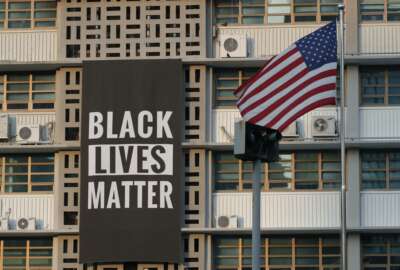

A federal district court has dismissed a lawsuit from the American Federation of Government Employees, which challenged a two-year-old advisory opinion from the...
A federal district court has dismissed a 2019 lawsuit from the American Federation of Government Employees, who had sued the Office of Special Counsel over Hatch Act guidance the agency released two years ago.
The union, along with attorneys from the progressive organization American Oversight and law firm Arnold and Porter, had argued that a November 2018 advisory from OSC was a violation of federal employees’ First Amendment rights.
The advisory in question was a warning to federal employees, advising them that displays of “#Resist” or verbally advocating for or against the impeachment of President Donald Trump could be a Hatch Act violation.
The guidance only applied to federal employees while they’re on duty at their official work sites and doesn’t prohibit employees from engaging in such activities while they’re away from the workplace or off duty, OSC said.
AFGE had asked the court nearly a year ago to block the 2018 Hatch Act advisory from OSC. Attorneys asked for immediate relief from the OSC guidance back in January, when the Senate considered Trump’s impeachment.
In general, the Hatch Act limits federal employees from engaging in certain political activities while “on duty” and in their official capacity as public servants.
On Monday, a judge for the U.S. District Court for the District of Maryland dismissed the case, claiming the court lacked the proper subject matter jurisdiction and the plaintiffs’ claims were not “ripe” for judicial review.
Drawing on prior case law, the court said the plaintiffs’ claims against a Hatch Act advisory opinion were a “challenge to OSC’s ‘forecast’ of what may occur in hypothetical scenarios” and lacked “appropriate timing of judicial intervention.”
And because OSC’s Hatch Act advisories are non-binding — and the Merit Systems Protection Board is free to disregard the guidance in ruling on potential violations of the act — the court determined AFGE’s claims were not fit for judicial review and didn’t pose undue hardship to the plaintiffs.
“OSC here has not been asked to opine on any particular event involving plaintiff members,” the judge’s opinion reads. “Nor have plaintiffs provided any specific allegation as to how the advisory opinion interferes with their First Amendment rights. At best, two of plaintiffs’ members aver generally that they ‘wish to express an opinion’ about important political topics at work.”
In its original complaint, AFGE argued the OSC advisory was “unconstitutionally overbroad” and the guidance “chilled” members’ speech.
But in the 2018 advisory, OSC said its guidance wasn’t designed to prohibit all discussions of impeachment in the federal workplace. Federal employees can generally discuss impeachment, as long as they’re not advocating for or against the removal of a particular candidate for federal office, OSC said.
Finally, the court argues adjudicating the constitutionality of any OSC advisory opinion would open the agency up to future judicial challenges.
“OSC, in turn, would be spending its precious resources in litigation at the expense of fulfilling its congressionally mandated role as advisor and safe harbor,” the judge wrote.
OSC on Wednesday applauded the federal district court’s decision.
“For the Hatch Act to serve the purpose of protecting the civil service system, it is incumbent on OSC’s career Hatch Act attorneys to provide timely and relevant information to federal employees about how they can stay in compliance with the law,” Special Counsel Henry Kerner said Wednesday in a statement. “By statute, OSC has a robust advisory function and is frequently asked to clarify what is considered political activity under the Hatch Act. By dismissing this lawsuit, the Court preserves OSC’s important advisory role.”
AFGE called the decision an “obvious disappointment” and said it would continue to evaluate its options.
“The court’s opinion does not give sufficient consideration to the profound chilling effect that OSC’s guidance has on the First Amendment rights of federal employees,” Everett Kelley, AFGE’s national president, said in a statement. “We look forward to providing a more comprehensive statement once we have completed our evaluation.”
OSC has issued several Hatch Act advisories for federal employees throughout its history. According to the judge’s opinion, the agency issues about 50 formal advisories and nearly 1,300 informal opinions by phone or email on the Hatch Act each year.
In an advisory issued earlier this summer, OSC determined discussions, displays or references to Black Lives Matter in the federal workplace are generally OK for employees in most circumstances. OSC decided BLM and its affiliated organizations are not political entities and are not associated with any known political party or campaign.
The Hatch Act doesn’t prohibit federal employees from engaging in issue-based advocacy, and therefore, has only a limited application to Black Lives Matter and related activities, OSC said.
The agency also reminded employees of their responsibilities to comply with the Hatch Act while working remotely and using web and video conference platforms during the pandemic.
Copyright © 2025 Federal News Network. All rights reserved. This website is not intended for users located within the European Economic Area.
Nicole Ogrysko is a reporter for Federal News Network focusing on the federal workforce and federal pay and benefits.
Follow @nogryskoWFED



